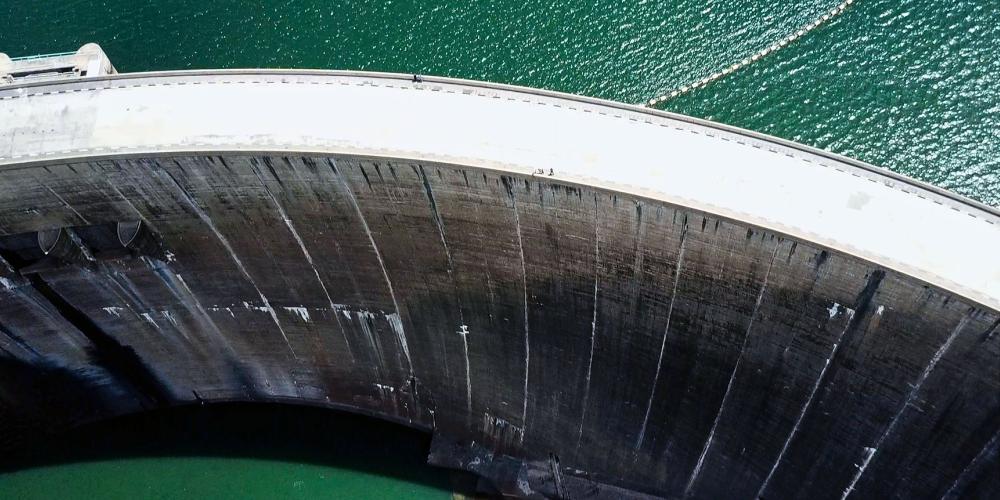
Hydropower, traditionally one of Africa’s most important sources of electricity, is expected to rapidly lose out in importance in favour of solar power in the coming years. The attractiveness of new hydropower stations is declining, due to increasing economic competition from solar panels and ongoing uncertainty over the effects of climate change on river flows. The majority of planned new dams in Africa should therefore probably never be built, according to a new study published in Science in which VUB professors Sebastian Sterl and Wim Thiery took part.
Abundant rainfall, deep gorges, enormous waterfalls: the geography of Africa has all the ingredients for producing electricity from rivers. Many African countries have relied on hydropower for their energy for decades, with projects that inspire both awe and controversy – like Ghana’s Lake Volta, the largest artificial lake in the world, or the Grand Ethiopian Renaissance Dam, Ethiopia’s prestigious project to give millions of its citizens access to electricity. The DRC has dreamed for years of building the Grand Inga hydroelectric power station, which “could light the whole of Africa”. And there are many voices calling for more of the same: it is estimated that Africa has barely exploited 10% of its hydroelectric potential.
A new study by researchers in Italy, Belgium, Austria and Ethiopia suggests that building hundreds of new hydroelectric dams in Africa could be a bad idea. The study used a detailed energy model to investigate which combination of power sources would be the most cost-effective for African countries to meet the growing demand by 2050, comparing hydro with solar, wind, coal, gas, nuclear and other energy sources. The study looked at each possible future hydroelectric stations in Africa separately, each with its own storage capacity, river flow profile, and interaction with other dams.
“The unique part of our study is that we modelled every hydropower station in Africa separately – both existing and planned stations,” said Dr Angelo Carlino, lead author of the study. “This allowed our model to determine which stations would be a smart investment and which ones should probably not be built.”
The numbers provide a sobering picture of the future of hydropower in Africa. The study showed that up to 67% of the possible future hydropower stations in Africa may not be worth the investment. Hydropower will soon be largely unable to compete economically with solar power, and to a lesser extent with wind energy, the costs of which have seen an unprecedented fall in the past 10 years.
Furthermore, the effects of long-term drought on hydropower, likely to be exacerbated by climate change, would have to be offset by extra investment. “That’s another reason why solar power will become the most attractive technology in the long term,” said Professor Wim Thiery, climate scientist at VUB and co-author of the study.
So is it game over for hydropower? Not completely, the study explains: in the short term, certain new hydroelectric power stations will still be able to deliver low-cost energy to countries in need, and they can be used flexibly to help with the integration of solar and wind power, whose production fluctuates.
“Our model shows which specific hydropower stations can still be cost-effective in the short term,” said Professor Andrea Castelletti, lecturer in natural resource management at the Politecnico di Milano and senior author of the study. “Particularly in the Congo, Niger and Nile basins, there are certain projects that will be worthwhile, as long as they’re properly planned and the damaging environmental effects are limited to a minimum.”
In the long term, solar power will come to the fore in most African countries as the most attractive technology. This reflects the prediction of the International Energy Agency in 2020 that solar power will soon be the new “king” of worldwide electricity production.
“The window in which hydropower remains a sensible investment in Africa will close very soon,” said Professor Sebastian Sterl, expert in energy meteorology at VUB and senior scientist at the World Resources Institute in Addis Ababa, Ethiopia. The study suggests that after 2030, only a limited number of hydropower stations in the whole of Africa will remain attractive investments. “Aside from cost-effectiveness, this is also generally good news for the environment: it means that many rivers will not have to be dammed and can continue their natural course.”
The study appeared in Science under the title “Declining cost of renewables and climate change curb the need for African hydropower expansion”.